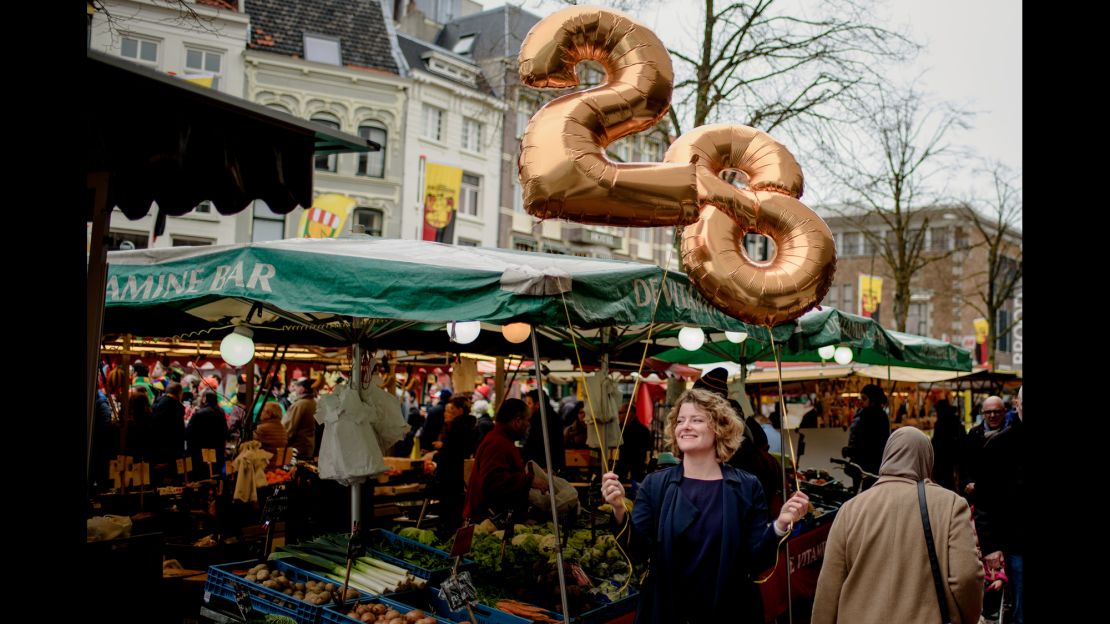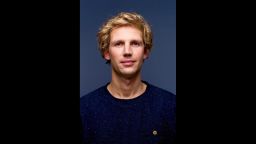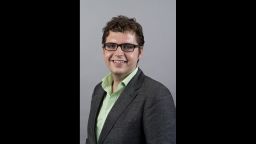The 48-hour countdown to the Dutch elections has begun. But of the 150 seats up for grabs in the House of Representatives, just seven are currently filled by politicians under 35 – even though this age group makes up a quarter of eligible voters.
From a high school dropout to a top lawyer, here are some of the men and women hoping to lower the average age of Dutch MPs a little by earning a spot in the House this week.
‘The parties in government now can’t be trusted’

Ancilla van de Leest, 31, is the leader of the Pirate Party. Formed in 2006, the group hopes to win its first seat on Wednesday.
Van de Leest was educated at a prestigious school but left at 16. “I never planned to leave school early; that’s just what happened,” she said. “I’m a high school dropout.”
Discovered as a model shortly afterwards, she traveled the world, but in 2012, she quit her “glamorous life” to join Bits of Freedom, a digital rights organization.
“As an online entrepreneur I’ve seen the upsides of the internet,” she explains. “But as time progressed, I saw how the internet was becoming more centralized. It used to be a tool to empower citizens, but it’s becoming a tool for big corporations.”
She’s also concerned about the ability of governments to gather information about their citizens. “In Europe, governments have a history of misusing power in horrific ways. If we don’t redefine the ethical and moral code of the internet now, we’re going to run into trouble.”
“People can see that the parties in government right now can’t be trusted,” she says.
If elected, she wants to fight laws that allow data about individuals to be sold for commercial purposes, prevent health insurance companies accessing citizens’ health information and tackle Amsterdam’s tax havens.
‘A diverse society can be beautiful’

Giselle Schellekens, 27, is a candidate for the Labor Party, the second biggest group in parliament, with 38 seats.
Before moving to the Netherlands with her parents at 15, she lived in Botswana, Nicaragua, Burkina Faso and Kenya. Upon her arrival, she became acutely aware of the gulf between European and African standards of living. She was amazed by “the perfect pavements, the trash being collected every Tuesday evening at 6pm sharp … the faultless public transport.”
Determined to fight this inequality, she began working for SPARK, an NGO that educates and empowers young people in fragile states. But she soon noticed inequality in the Netherlands too, and became involved in local politics. Since 2014 she has combined her NGO role with the job of city councilor.
Now she wants to move into full-time politics: “If I work with an NGO, I can change a few lives,” she says. “If you change a policy, you can make a lot of lives better.”
Her priorities are to fight the “internship slavery” faced by Dutch graduates, lower the voting age to 16 and create more housing and work opportunities for refugees.
She believes first and foremost in helping people to build their lives in their own countries, “but we should always keep the borders open,” she says, adding that the Netherlands needs to work harder at integrating migrants and refugees.
“A diverse society can be really beautiful.”
‘We need to make the Netherlands future-proof’

Dennis Wiersma, 31, is standing on behalf of the People’s Party for Freedom and Democracy (VVD), currently the largest party in the Netherlands’ parliament — its leader Mark Rutte has been Prime Minister since 2010.
Wiersma’s fledgling political career was inspired by his experiences as a child of divorced parents and whose mother received disability benefits.
“I realized that I wanted to do things differently later in life, to take matters into my own hands instead of letting circumstances define me,” he says.
His time as a student – and as vice-president of the Dutch Student Union – also influenced his politics.
“At the time the country was still suffering from the credit crisis, which made me wonder about my friends who were not highly educated,” he says. “Who was looking out for them?”
Youth unemployment and pensions are two of his key concerns: “My mission is to make the Netherlands future-proof, by ensuring great education … and an adequate pension. And to be able to do all this in a sustainable and safe world.”
He has a clear vision of what he’d like the Netherlands of the future to look like. “The Netherlands is a country of freedom, one that stands for the equal value of men and women, gay and straight people, black and white people,” he says. “Those who support these values, will feel at home in the Netherlands. But those who do not, do not belong here.”
‘What this country needs are bridge-builders’

Don Ceder, 27, is standing on behalf of the Christian Union, which currently holds five seats in the House of Representatives.
Ceder grew up in a multicultural neighborhood in Amsterdam. After graduating from law school, he set up his own paralegal agency to advocate for people badly impacted by debt collection agencies.
In 2014, he was nominated for Amsterdam citizen of the year for his work.
He wants to help contain the growing debt problem, build an education system that creates equal opportunities for everyone, and fight discrimination.
The child of a Surinamese father and a Ghanaian mother, Ceder is no stranger to prejudice. “I can identify with a lot of people who feel marginalized because of their cultural background, because I’ve experienced it first hand,” he says.
And he’s concerned about the gulf between parliament and society: “There is a huge group of Dutch people who feel that they’re not being represented, and this group transcends color, age, gender and cultural background.”
He says he wants to be a voice for all Dutch citizens and to build a society “where everyone matters,” adding: “What this country needs right now are bridge-builders, not wall-builders.”
‘Politicians are opinion makers’

Niels van den Berge, 32, is seeking election for the Green Left party, which currently holds four seats, down from 10 in 2010.
Van den Berge was born into a farming family and grew up fruit-picking and beekeeping, before getting involved in politics as a teenager.
At 16 he was advocating in parliament for a national youth council; by 17 he was the spokesperson for the youth wing of Green Left. In 2010, he became a temporary MP while a colleague was on maternity leave. Now he’s campaigning for his own seat.
He wants to introduce a climate law, close coal power stations and promote investment in renewable energy.
He’s concerned about the current political climate in the Netherlands: “Some people say that Dutch culture is under threat because of immigration. I think it’s under threat because of populism.”
He wants to engage with voters attracted by the policies of Geert Wilders’ populist Freedom Party. “I understand their fears … If I were in their shoes I would also be angry … But I don’t agree with populist answers to their problems.”
But he believes politics isn’t just about policy. “Politicians aren’t just legislators,” he says. “They are opinion makers too. Words matter … We need to make a statement that we can make this beautiful country – and Europe and the world – even more beautiful, but we have to do it together.”
‘Young people are tired of the current parliament’

Rob Jetten, 29, is a candidate for Democrats 66 (D66). The party won 12 seats in the last election, up from three in 2006.
Jetten grew up in a small town in the south of the Netherlands, and says his political career was indirectly kickstarted at the age of 16 by the murder of Dutch filmmaker Theo van Gogh.
Van Gogh was killed by Mohammed Bouyeri, a Dutch-Moroccan Muslim, in 2004; Jetten says a local primary school with a large Turkish student population was set on fire shortly afterwards.
“I organized meetings with the children who had lost their school,” he says. “They were very happy to see that not everyone was against them. I saw that even when you’re young you can make a difference … That was a turning point for me.”
He says he joined D66 as a reaction to the growth of populist politics and their rhetoric of division and discrimination.
Education and transport are two of his key concerns: “We need a new approach to public transport and cycling networks,” he says. The Netherlands may have a reputation as a cycling paradise, but Jetten says this is far from the truth. “There are 180,000 citizens in Nijmegen and we’re always in traffic jams.”
He’s broadly optimistic about the future of Dutch politics. “Young people are sick and tired of the current parliament that only talks about dangers. They’re sick and tired of all these populist debates … There’s a new generation of politicians on the way.”
‘I want to be a politician close to the people’

Anne Kuik, 30, is standing on behalf of the Christian Democratic Appeal (CDA), which won 13 seats in 2012 – down 28 seats from 2006, when it was by far the largest party in parliament.
Kuik became involved in politics after studying law at university, and was elected as a city councilor in Groningen in 2010. She says she has tried to improve working conditions for prostitutes and fought to make the city more accessible to people with disabilities.
“What drives me is injustice,” she says.
Tradition is a key part of her platform: “We want to go back to Christian Jewish norms and values that bind us as a nation,” she explains. “Norms and values that make it logical that we help each other so you are not just living for yourself.”
And she’s keen to be a part of the “strong society” that she advocates. It’s important “not to get stuck in my office,” she says. “I want to be a politician close to the people, fighting for injustice. [What matters is] what you do for the people and not how many times your names appears in the newspapers.”




